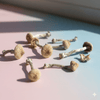Bryan Johnson, the biohacker known for his extreme anti-aging protocols, just announced that he’s testing psilocybin as a longevity therapy.
He says he will experiment with taking 5 grams of dried psilocybin mushrooms once a month, for three months, while tracking everything from brain activity to telomere length.
Here’s his full protocol:
-
Dose: 5g dried mushrooms (≈25–50mg psilocybin) monthly for 3 months
-
Measurements: DNA methylation (biological age), telomere length, functional brain measurements, advanced blood biomarkers, structural changes in the brain (MRI), mood, and cognition.
-
Goal: test whether psilocybin can rejuvenate the brain and body
Why is the world's most famous death defier turning to shrooms, you may ask. Well its' because of a fascinating new study published in npj Aging in July 2025.

Magic Mushrooms For Longevity?
The groundbreaking new paper published in npj Aging (July 2025) suggests that psilocybin may actually slow cellular ageing and extend lifespan.
This is the first-ever experimental evidence that a psychedelic compound can delay senescence (cellular ageing) and improve survival in aged animals. And it’s sparking major interest among longevity researchers like biohacker Bryan Johnson.
Let’s break it down.
The Study: Psilocybin Extends Cellular Lifespan
Researchers began by studying human fibroblast cells, which are the same type of connective tissue cells that form skin and repair wounds.
When these cells were bathed in psilocin (the active metabolite of psilocybin), they lived longer while stayed biologically younger for longer.
Here’s what happened:
-
Cells treated with psilocin lived 29–57% longer, depending on the dose.
-
They divided more times before “ageing out.”
-
They showed less oxidative stress, less DNA damage, and longer telomeres (the protective caps on DNA that shorten with each cell division).
-
Key anti-aging pathways were activated: SIRT1 (the “longevity gene”) was increased, while stress and damage markers like GADD45a, p16, and p21 were reduced.
-
The antioxidant response regulator Nrf2 went up, while Nox4 (a major source of damaging reactive oxygen species) went down.
Together, these changes suggest that psilocin helps preserve cellular youth by reducing stress, protecting DNA, and extending the number of times a cell can divide before it senesces.
This effect occurred in both fetal and adult human cells, suggesting it’s a general, not age-specific, mechanism.
The Mouse Experiment: Longer, Healthier Lives

Next, the researchers turned to aged mice, the equivalent of 60–65-year-old humans.
They gave them psilocybin once per month for ten months, starting with a low dose (5 mg/kg) and increasing to 15 mg/kg.
The results were remarkable:
-
Survival rates jumped from 50% to 80%.
-
The treated mice looked younger, with smoother coats, darker fur regrowth, and healthier skin.
-
There were no major adverse effects or weight differences compared to controls.
In other words, psilocybin appeared to slow ageing even when treatment started late in life.
How Does It Work?
Psilocybin acts mainly on 5-HT2A serotonin receptors, which aren’t just in the brain but found throughout the body, including in the heart, immune cells, fibroblasts, and even mitochondria.
Activation of these receptors can trigger the SIRT1 longevity pathway, boosting antioxidant defences, and reduce inflammation. This mechanism is also known to extend lifespan in multiple species.
Previous studies have also shown that psychedelics can alter gene expression and epigenetic markers, such as DNA methylation, potentially explaining their long-term psychological and physiological effects.
This new study strengthens what’s been called the “psilocybin–telomere hypothesis”: that the mental and cellular benefits of psilocybin may share a biological root characterised by longer telomeres, slower ageing, and improved resilience to stress.

Why This Matters
If psilocybin can really delay ageing at the cellular level, it could represent a new class of geroprotective medicine. Unlike most anti-aging drugs, psilocybin also improves mood, cognition, and psychological flexibility, which are themselves tied to slower biological ageing.
The convergence of mind and metabolism here is profound and highlights the link between emotional healing and biological healing.
Bryan’s experiment is one of the first human self-trials to bridge those two worlds, measuring not just how psilocybin changes how you think, but how it changes how you age.
If these findings translate to humans, psilocybin could represent a new class of neuro-metabolic longevity molecules that target both the mind and the aging process itself.
And magic mushrooms could be about to get a lot more popular.






